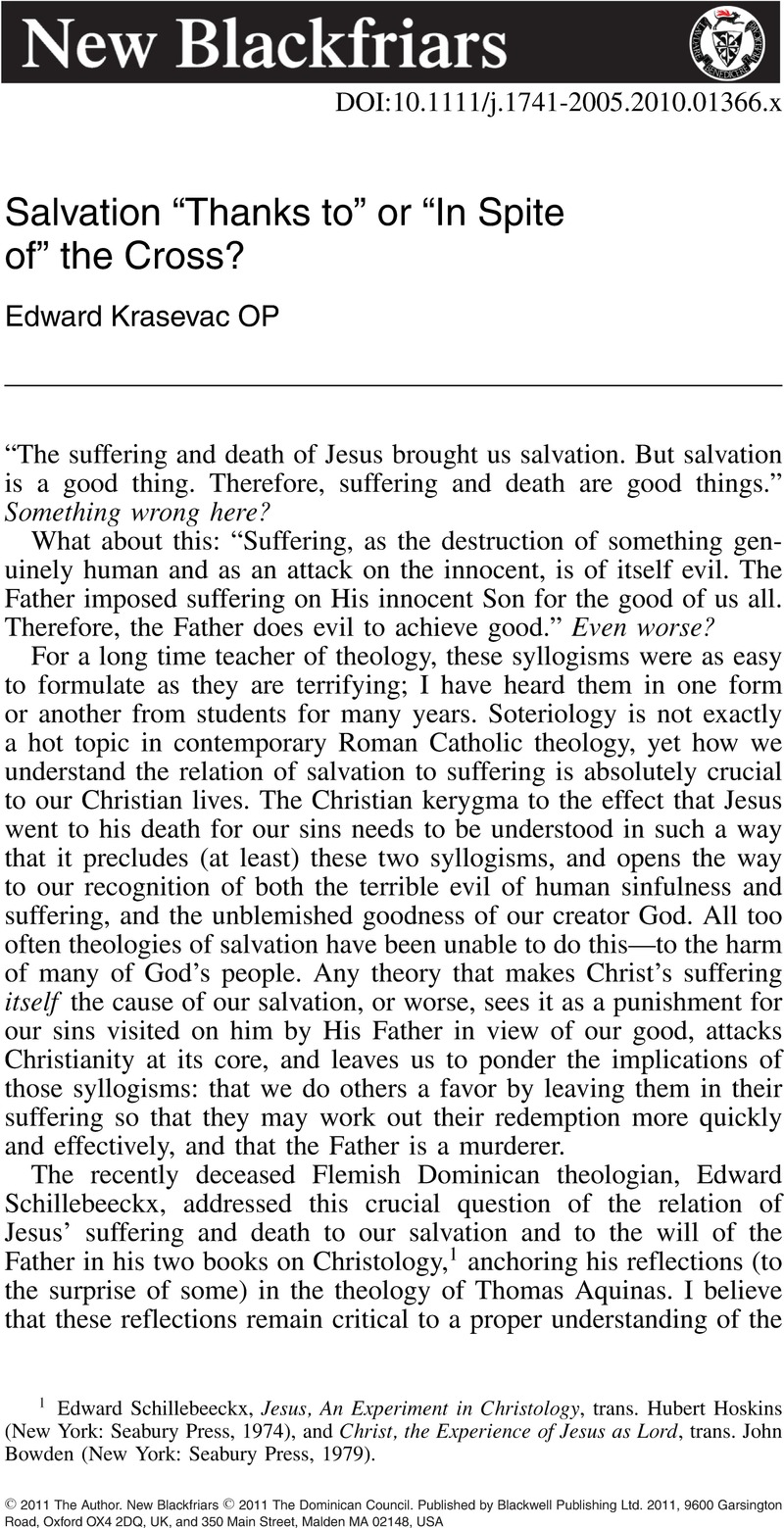No CrossRef data available.
Article contents
Salvation “Thanks to” or “In Spite of” the Cross?
Published online by Cambridge University Press: 01 January 2024
Abstract

- Type
- Original Articles
- Information
- Copyright
- © 2011 The Author. New Blackfriars © 2011 The Dominican Council
References
1 Schillebeeckx, Edward, Jesus, An Experiment in Christology, trans. Hoskins, Hubert (New York: Seabury Press, 1974)Google Scholar, and Christ, the Experience of Jesus as Lord, trans. Bowden, John (New York: Seabury Press, 1979)Google Scholar.
2 But what of other forms of suffering—those that do not directly come to us as a result of our loving service of God and others? What about the suffering of illness, physical and mental? What of the suffering brought about by “acts of God”—earthquakes, hurricanes, floods, tsunamis? These forms of suffering can also be sacrificial and salvific, of course, insofar as they are formed by love of God and others. Schillebeeckx's point, it seems to me, is only that these are not the paradigmatic forms of suffering for a Christian, but they certainly give us the opportunity to be conformed to Christ in analogous ways.
3 Schillebeeckx believes the concept of “loving service” is key to understanding Jesus life, because (among other reasons) it bridges the words and deeds of Jesus in the “active” first stage of his public ministry, when he served others by proclaiming (and explaining through parabolic words and actions) the dawning presence of the Kingdom, offering forgiveness (probably primarily in his table fellowship), healing, exorcizing, blessing, etc., and the more “passive” final stage in which his rejection led him to accept that the Kingdom would come now somehow through the Father's action in his sacrificial acceptance of that rejection and the suffering and death it entailed. Schillebeeckx would like to answer the question: are we saved by Jesus words and deeds, or by his suffering and death, by responding “both” (because we are saved by his life of “loving service” which was manifested in both ways).
4 Schoof, Ted, The Schillebeeckx Case: Official Exchange of Letters and Documents in the Investigation of Fr. Edward Schillebeeckx by the Sacred Congregation for the Doctrine of the Faith: 1976–1980 (New York: Paulist Press, 1984), p. 125Google Scholar.
5 Schillebeebckx, Christ, p. 729.
6 Schillebeeckx constantly makes the point that, in reality, Jesus’ was not wrong in the proclamation of the coming Kingdom because it was indeed realized—in his resurrection; the glorified Christ is the Kingdom of God.
7 Many interpreters realize that the placing of the first words of Psalm 22 in the mouth of Jesus on the cross were meant to bring to mind the very positive character of the entire Psalm. For Schillebeeckx, Psalm 22 expresses the believer's conviction that in situations where God's redemptive help and support cannot actually be experienced, in situations in which men no longer experience any glimmer of hope, in impossible situations, God nevertheless remains near at hand and that salvation consists in the fact that man still holds fast to God's invisible hand in this dark night of faith … There can be no question of the rejection and abandonment of Jesus by God … The resurrection of Jesus … will mean a break-through or manifestation of a presence of God which, though hidden beforehand, was nevertheless real in and with Jesus - what seems to be failure is in fact nothing of the sort. In that case the resurrection is a new factor which is nevertheless in line with what was already a living reality on the cross, but in a hidden way, within the contours of earthly contingency. (Schillebeeckx, Christ,, p. 825)
8 Schillebeeckx, Jesus, p. 638.
9 Schillebeeckx, Christ, p. 699.
10 Ibid., p. 837.
11 Schillebeeckx, Jesus, p. 638.
12 Schillebeeckx, Christ, p. 824.
13 Ibid., 837.




